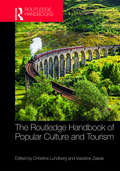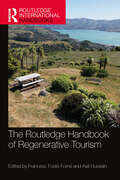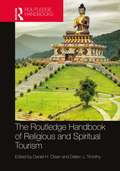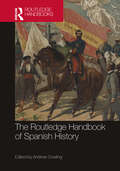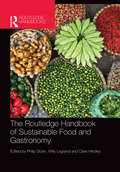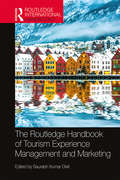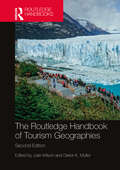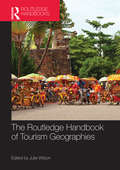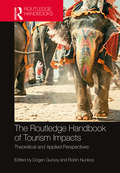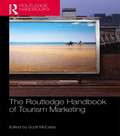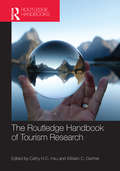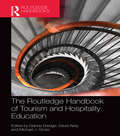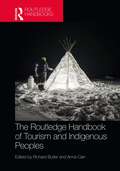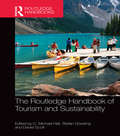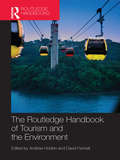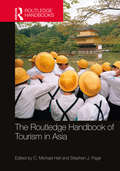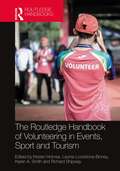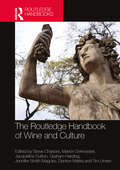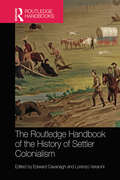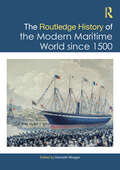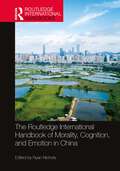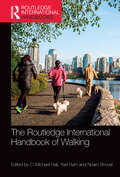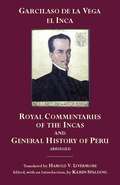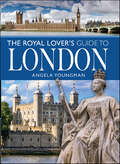- Table View
- List View
The Routledge Handbook of Popular Culture and Tourism
by Christine Lundberg Vassilios ZiakasThis handbook provides a comprehensive overview and holistic analysis of the intersection between tourism and popular culture. It examines current debates, questions and controversies of tourism in the wake of popular culture phenomena and explores the relationships between popular culture, globalization, tourism and mobility. In addition, it offers a cross-disciplinary, cutting edge review of the character of popular cultural production and consumption trends, analyzing their consequences for tourism, spatial strategies and destination competitiveness. The scope of the volume encompasses various expressions of popular culture such as cinema, TV shows, music, literature, sports and heritage. Featuring a mix of theoretical and empirical chapters, the handbook problematizes and conceptualizes the ties and clusters of popular cultural actors, thereby positioning tourism within the wider context of creative economies, cultural planning and multimodal technologies. Written by an international team of academics with expertise in a range of disciplines, this timely book will be of interest to researchers from a variety of subjects including tourism, events, geography, cultural studies, fandom research, political economy, business, media studies and technology.
The Routledge Handbook of Regenerative Tourism (Routledge International Handbooks)
by Francesc Fusté-Forné Asif HussainThis timely and innovative handbook provides a comprehensive overview of the current critical debates, trends, and the transformative potential of regenerative tourism, and also looks towards a more responsible, inclusive, and sustainable future for tourism.Comprising specifically commissioned, original contributions from recognised authors and experts in the field, the book provides a logically structured and systematic guide to the current state of knowledge in this area. It is interdisciplinary in coverage and international in scope through its authorship and content. The volume commences with an assessment of the principles and theoretical foundation of regenerative tourism, which provides a context to explore the policy, planning, development, destination management and marketing, local impacts, manifestations, and future of regenerative tourism.This is essential reading for students, researchers, academics, practitioners, policymakers, government officials, and industry professionals interested in the possibilities of responsible and sustainable, and regenerative forms of tourism.
The Routledge Handbook of Religious and Spiritual Tourism
by Dallen J. Timothy Daniel H. OlsenThe Routledge Handbook of Religious and Spiritual Tourism provides a robust and comprehensive state-of-the-art review of the literature in this growing sub-field of tourism. This handbook is split into five distinct sections. The first section covers past and present debates regarding definitions, theories, and concepts related to religious and spiritual tourism. Subsequent sections focus on the supply and demand aspects of religious and spiritual tourism markets, and examine issues related to the management side of these markets around the world. Areas under examination include religious theme parks, the UNESCO branding of religious heritage, gender and performance, popular culture, pilgrimage, environmental impacts, and fear and terrorism, among many others. The final section explores emerging and future directions in religious and spiritual tourism, and proposes an agenda for further research. Interdisciplinary in coverage and international in scope through its authorship and content, this will be essential reading for all students, researchers, and academics interested in Tourism, Religion, Cultural Studies, and Heritage Studies.
The Routledge Handbook of Spanish History
by Andrew DowlingThis handbook offers comprehensive coverage of the history of Spain, exploring key themes and events in four broad but not necessarily rigid temporal categories: medieval, early modern, nineteenth century and twentieth century. The volume situates Spanish history firmly within the broader patterns unfolding across the European continent, emphasizing Spain’s active participation in the processes that determined the development of modern European society. With chapters from leading scholars from both Spanish and international universities, the book helps fill long-standing gaps in European history. This handbook provides original contributions on broad themes in Spanish history which are also accessible syntheses of the most recent scholarship. Making the latest research in Spanish history more widely accessible to an international audience, The Routledge Handbook of Spanish History is an essential reference point for students and scholars of Spain, as well as those working in comparative European history.
The Routledge Handbook of Sustainable Food and Gastronomy
by Philip Sloan Willy Legrand Clare HindleyThe issues surrounding the provision, preparation and development of food products is fundamental to every human being on the planet. Given the scarcity of agricultural land, environmental pollution, climate change and the exponential growth of the world’s population where starvation and obesity are both widespread it is little wonder that exploring the frontiers of food is now a major focus for researchers and practitioners. This timely Handbook provides a systematic guide to the current state of knowledge on sustainable food. It begins by analyzing the historical development surrounding food production and consumption, then moves on to discuss the current food crisis and challenges as well as the impacts linked to modern agriculture and food security. Finally, it concludes with a section that examines emerging sustainable food trends and movements in addition to an analysis of current food science innovations. Developed from specifically commissioned original contributions the Handbook’s inherent multidisciplinary approach paves the way for deeper understanding of all aspects linked to the evolution of food in society, including insights into local food, food and tourism, organic food, indigenous and traditional food, sustainable restaurant practices, consumption patterns and sourcing. This book is essential reading for students, researches and academics interested in the possibilities of sustainable forms of gastronomy and gastronomy’s contribution to sustainable development. The title includes a foreword written by Roberto Flore, Head Chef at the Nordic Food Lab, Copenhagen, Denmark.
The Routledge Handbook of Tourism Experience Management and Marketing (Routledge International Handbooks)
by Saurabh Kumar DixitThe Routledge Handbook of Tourism Experience Management and Marketing offers a comprehensive and thorough inquiry into both customary and emergent issues of tourism experience and co-creation. Drawing together contributions from 83 authors from 28 countries with varied backgrounds and interdisciplinary interests, the handbook highlights multiple representations and interpretations of the theme. It also integrates a selection of illustrative global case studies to effectively present its chapter contents. Tourism experience drives the contemporary tourist’s behavior as they travel in pursuit of experiencing unique and unusual destinations and activities. Creating a memorable and enduring experience is therefore a prerequisite for the all tourism business organizations irrespective of the nature of their products or services. This handbook focuses on conceptualizing, designing, staging, managing and marketing paradigms of tourism experiences from both supply and demand perspectives. It sheds substantial light on the contemporary theories, practices and future developments in the arena of experiential tourism management and marketing. Encompassing the latest thinking and research themes, this will be an essential reference for upper-level students, researchers, academics and industry practitioners of hospitality as well as those of tourism, gastronomy, management, marketing, consumer behavior, cultural studies, development studies and international business, encouraging dialogue across disciplinary boundaries.
The Routledge Handbook of Tourism Geographies
by Dieter K. Müller Julie WilsonThe Routledge Handbook of Tourism Geographies, 2nd Edition, offers a comprehensive re-evaluation of the recent developments; conceptual, theoretical and empirical debates; and critical issues in this field of study.Reflecting on and building from its original aim of rethinking geographical approaches to tourism, the volume explores contemporary tourism contexts and concepts, as marked by the present era of polycrises, setting out renewed and reoriented perspectives on tourism geographies into the mid-2020s. Across its diverse range of contributions, the Handbook navigates the complexities of tourism as a shifting construct, situating tourism geographies within the socio-spatial, economic and environmental implications of tourism, leisure and mobilities in the new contexts of global change, ecological transition and digital transformation. The volume aims to provide a nuanced and detailed analysis of established and emerging discourses and debates within tourism geographies, underscoring the field’s inherent criticality and ideal positioning for understanding and catalysing complex global and local scenarios in contemporary tourism, leisure and mobilities.Written by leading scholars in the tourism geographies field, this text is an invaluable resource for students, researchers and scholars working in the areas of tourism, geography and related disciplines, encouraging dialogue across areas of study.
The Routledge Handbook of Tourism Geographies
by Julie WilsonGeographical analysis of tourism spaces and places is advancing fast. In terms of human geography, the various recent academic ‘turns’ have led to fresh examination of existing debates and have advanced new theoretical ideas in geography that are more salient than ever for tourism studies. The Routledge Handbook of Tourism Geographies seeks to examine such recent developments by providing a state-of-the-art review of the field, documenting advances in research and evaluating different perspectives, approaches, techniques and contexts. The Routledge Handbook of Tourism Geographies considers recent disciplinary developments (including post-disciplinarily) in geography in relation to the study of tourism. It also analyzes the fledging relationships of the new mobilities paradigm, critical tourism studies and cultural political economy to tourism spaces and places, as well as acknowledging a spatial turn in poststructuralist social sciences more generally. In addition, it evaluates how postcolonial, feminist, sensory, performative and queer perspectives have diversified research in the tourism geographies field. Spatial analysis, time geography, placemaking and landscape concerns are addressed and issues such as transport, environmental discourses and development are also analyzed. Finally, the volume’s contributions highlight key areas for advancing research and map out the dimensions of future trajectories in tourism geographies in different theoretical and thematic contexts. Written by leading scholars in the tourism geographies field, this text will provide an invaluable resource for all those with an interest in tourism geographies, encouraging dialogue across disciplinary boundaries and areas of study.
The Routledge Handbook of Tourism Impacts: Theoretical and Applied Perspectives
by Dogan Gursoy Robin NunkooThis handbook explores and critically examines both positive and negative impacts of tourism development focusing on the past, present and future issues, challenges and trends from a multidisciplinary global perspective. Through a comparative approach involving international case studies, this book explores our understanding of tourism impacts and contributes to the theoretical development on relationships between tourism impacts and community support for tourism development. This handbook focuses on a variety of geographical locations, drawing from the knowledge and expertise of highly regarded academics from around the world. Specifically, it explores the adoption and implementation of various tourism development and impact management approaches in a wide range of global contexts, while identifying their trends, issues and challenges. It addresses strategies relating to innovation, sustainability and social responsibility, and critically reviews the economic, sociocultural, environmental, political and technological impacts of tourism. The text also identifies future trends and issues, as well as exploring the methods used to study tourism impacts. Conveying the latest thinking and research, this handbook will be a key reference for students, researchers and academics of tourism, as well as development studies, geography, cultural studies, sustainability and business, encouraging dialogue across disciplinary boundaries and areas of study.
The Routledge Handbook of Tourism Marketing
by Scott McCabeTourism has often been described as being about ‘selling dreams’, tourist experiences being conceptualized as purely a marketing confection, a socially constructed need. However, the reality is that travel for leisure, business, meetings, sports or visiting loved ones has grown to be a very real sector of the global economy, requiring sophisticated business and marketing practices. The Routledge Handbook of Tourism Marketing explores and critically evaluates the current debates and controversies inherent to the theoretical, methodological and practical processes of marketing within this complex and multi-sector industry. It brings together leading specialists from range of disciplinary backgrounds and geographical regions to provide reflection and empirical research on this complex relationship. The Handbook is divided in to nine inter-related sections: Part 1 deals with shifts in the context of marketing practice and our understanding of what constitutes value for tourists; Part 2 explores macromarketing and tourism; Part 3 deals with strategic issues; Part 4 addresses recent advances in research; Part 5 focuses on developments in tourist consumer behaviour; Part 6 looks at micromarketing; Part 7 moves on to destination marketing and branding issues; Part 8 looks at the influence of technological change on tourism marketing; and Part 9 explores future directions. This timely book offers the reader a comprehensive synthesis of this sub-discipline, conveying the latest thinking and research. It will provide an invaluable resource for all those with an interest in tourism and marketing, encouraging dialogue across disciplinary boundaries and areas of study. This is essential reading for Tourism students, researchers and academics as well as those of Marketing, Business, Events Management and Hospitality Management.
The Routledge Handbook of Tourism Research
by William C. Gartner Cathy H. C. HsuThe Routledge Handbook of Tourism Research is a compendium of some of the most relevant issues affecting tourism development today. The topics addressed in this book provide some new thinking for those involved in tourism research. This book takes the reader from the beginnings of tourism research to a discussion of emerging forms of tourism and selected examples of tourism development. The underlying theoretical dimensions are reviewed, analysed and discussed from a number of perspectives. This book brings together leading researchers, many of whom are members of the International Academy for the Study of Tourism, to discuss tourism today and its future. The works included in this volume are diverse, in terms of geographical context, research methodology, root discipline, and perspective. This book represents studies based in Europe, North America, Oceania, and Asia. Research methodologies include both quantitative and qualitative. Both macro and micro issues are discussed from the economic, psychological, sociological, political science, marketing, and other perspectives, which reflect the interdisciplinary nature of tourism studies. This book is divided into 6 sections. Section 1 considers the foundations for tourism research. Section 2 discusses the implications for destination management and section 3 discusses planning for tourism development. Section 4 covers human capital for tourism development. And finally, section 5 evaluates emerging forms of tourism and then section 6 offers insights into tourism evolution. It offers the reader a comprehensive synthesis of this field, conveying the latest thinking and research. The text will provide an invaluable resource for all those with an interest in tourism research. This is essential reading for students, researchers & academics of Tourism as well as those of related studies in particular Leisure, Hospitality & Development Studies.
The Routledge Handbook of Tourism and Hospitality Education (F. Scott Fitzgerald Manuscripts)
by Dianne Dredge David Airey Michael J. GrossTourism is much more than an economic sector, it is also a social, cultural, political, and environmental force that drives societal change. Understanding, responding to, and managing this change will inevitably require knowledge workers who are able to address a range of problems associated with tourism, travel, hospitality, and the increasingly complex operating environment within which they exist.The purpose of this Handbook is to provide an insightful and authoritative account of the various issues that are shaping the higher educational world of tourism, hospitality and events education and to highlight the creative, inventive and innovative ways that educators are responding to these issues. It takes as its central focus a dynamic curriculum space shaped by internal and external factors from global to local scales, a variety of values and perspectives contributed by a range of stakeholders, and shifting philosophies about education policy, pedagogy and teaching practice. A benchmark for future curriculum design and development, it critically reviews the development of conceptual and theoretical approaches to tourism and hospitality education. The Handbook is composed of contributions from specialists in the field, is interdisciplinary in coverage and international in scope through its authorship and content.Providing a systematic guide to the current state of knowledge on tourism and hospitality education and its future direction this is essential reading for students, researchers and academics in Tourism, Hospitality, Events, Recreation and Leisure Studies.
The Routledge Handbook of Tourism and Indigenous Peoples
by Anna Carr Richard ButlerThe Routledge Handbook of Tourism and Indigenous Peoples presents an up-to-date, critical and comprehensive overview of established and emerging themes around Indigeneity and connections between Indigenous peoples and tourism development.Offering socio-cultural perspectives and multidisciplinary insights from leading Indigenous and non-Indigenous scholars and tourism practitioners, the book explores contemporary issues, challenges and trends. Organised into six sections, the handbook explores Indigenous community involvement in tourism, Indigenous entrepreneurship and innovation, Indigenous tourism policies and politics, and the complexities of colonialism and decolonisation issues. This text focuses on the active role that Indigenous peoples have in the industry and uses international case studies and experiences to explore the global context of Indigenous tourism.This handbook fills a notable gap by offering a critical and detailed understanding of the role of Indigenous practitioners and societies in tourism and how they interact within the tourism nexus. It will be of interest to scholars, students, tourism practitioners and policymakers working in tourism, development studies, anthropology, human geography and sociology.
The Routledge Handbook of Tourism and Sustainability
by C. Michael Hall Daniel Scott Stefan GosslingRoutledge Handbook of Tourism and Sustainability from C. Michael Hall, Stefan Gössling, Daniel Scottis one of the winners of the ITB BookAwards 2016 in the category Specialist tourism literature! Sustainability remains one of the major issues in tourism today. Concerns over climate and environmental change, the fallout from the global economic and financial crisis, and the seeming failure to meeting UN Millennium development goals have only reinforced the need for more sustainable approaches to tourism, however they be defined. Given the centrality of sustainability in tourism curricula, policies, research and practice it is therefore appropriate to prepare a state of the art handbook on the relationship between tourism and sustainability.This timely Handbook of Tourism and Sustainability is developed from specifically commissioned original contributions from recognised authors in the field, providing a systematic guide to the current state of knowledge on this area. It is interdisciplinary in coverage and international in scope through its authorship and content. The volume commences with an assessment of tourism’s global environmental, e.g. climate, emissions, energy use, biodiversity, water use, land use, and socio-economic effects, e.g. economic impacts, employment and livelihoods, culture. This then provides the context for sections outlining the main theoretical frameworks and constructs that inform tourism and sustainability, management tools and approaches, and the approaches used in different tourism and travel industry sectors. The book concludes by examining emerging and future concerns in tourism and sustainability such as peak-oil, post-carbon tourism, green economy and transition tourism.This is essential reading for students, researches and academics interested in the possibilities of sustainable forms of tourism and tourism’s contribution to sustainable development. Its assessment of tourism’s global impact along with its overviews of sectoral and management approaches will provide a benchmark by which the sustainability of tourism will be measured for years to come.
The Routledge Handbook of Tourism and the Environment
by Andrew Holden David FennellThe Routledge Handbook of Tourism and the Environment explores and critically evaluates the debates and controversies inherent to tourism’s relationship with nature, especially pertinent at a time of major re-evaluation of our relationship with the environment as a consequence of the environmental problems we now face. It brings together leading specialists from range of disciplinary backgrounds and geographical regions, to provide state-of-the-art theoretical reflection and empirical research on this complex relationship and future direction. The book is divided in to five interrelated sections. Section one evaluates the philosophical basis, rationale and complexity of what is meant by the term ‘environment’ considering the major influences in the construction of how we understand our surroundings and the types of values we place upon them. Section two evaluates the types of eco-systems that are used as natural resources for tourism and the negative and positive impacts upon them. Section three evaluates relevant environmental policy and management mechanisms for the impacts of tourism on the natural environment. Section four focuses on the changing tourism-environment relationship, and the types of tourism that have become established in the tourism industry, market and policy. Section five, analyzes contemporary and future issues of the tourism-environment relationship, based upon themes of environmental and social welfare. This timely book will provide an invaluable resource for all those with an interest in tourism’s relationship with the natural environment, encouraging dialogue across disciplinary boundaries and areas of study. The book is international in its focus, emphasizing that issues of tourism and the natural environment are not only localized but transcend national boundaries that sometimes require both international and global responses. This is essential reading for student, researchers and academics of Tourism as well as those of Geography, Environmental Studies and Development Studies.
The Routledge Handbook of Tourism in Asia
by C. Michael Hall Stephen J. PageAsia is regarded as the fastest growing area for international and domestic tourism in the world today and over the next 20 years. Given the economic, social and environmental importance of tourism in the region, there is a need for a comprehensive and readable overview of the critical debates and controversies in tourism in the region and the major factors that are affecting tourism development both now and in the foreseeable future. This Handbook provides a contemporary survey of the region and its continued growth and development as a key destination and generator of tourism, which is marked by a high proportion of intra-regional travel. The book is divided into five sections. This first section provides an introduction to the region and context to the nationally focused chapters. The next three sections are then broadly based on the three UNWTO Asian regions: South-East Asia, South and Central Asia, and East and North-East Asia, providing readers with a valuable snapshot of tourism at various scales, and from various approaches and positions. The concluding section considers future prospects for tourism in Asia. The handbook is interdisciplinary in coverage and is also international in scope through its authorship and content. It presents a range of perspectives and understanding of the processes and forces that are shaping tourism in this fascinating and dynamic region that is one of the focal points of global tourism. This is essential reading for students, researchers and academics interested in tourism in the growth region of Asia now and in the future.
The Routledge Handbook of Volunteering in Events, Sport and Tourism
by Kirsten HolmesThis timely handbook examines the most contemporary, controversial and cutting-edge issues related to the involvement of volunteers in the fields of events, sport and tourism. Split into thematic sections, the primary areas covered include: key disciplinary approaches to understanding volunteerism, international contexts, managing volunteers, the impacts and legacies of volunteering and future trends in these sectors including online and digital volunteering. Commonalities and differences of volunteering in these sectors are drawn out throughout the volume. A diverse range of case studies are examined including the 2007 UEFA Under 21 Championship hosted by Poland, the development of the Appalachian National Scenic Trail, the Vancouver, London and Pyeong Chang Olympic Games, Belgium’s National Day in 2019, the Puffing Billy railway in Australia, as well as many other examples looking at destination services organizations, museums, grassroots associations, corporate events, community events and visitor attractions. Drawing on the academic and practical expertise of over 50 authors from across the globe, the handbook provides an invaluable resource for all those with an interest in volunteering in these sectors, encouraging dialogue across disciplinary boundaries and areas of study in order to advance volunteering research and practice in the fields of events, sport and tourism.
The Routledge Handbook of Wine and Culture
by Jennifer Smith Maguire Tim Unwin Marion Demossier Jacqueline Dutton Steve Charters Graham Harding Denton MarksThe link between culture and wine reaches back into the earliest history of humanity. The Routledge Handbook of Wine and Culture brings together a newly comprehensive, interdisciplinary overview of contemporary research and thinking on how wine fits into the cultural frameworks of production, intermediation and consumption. Bringing together many leading researchers engaged in studying these phenomena, it explores the different ways in which wine is constructed as a social artefact and how its representation and use acquire symbolic meaning. Wine can be analysed in different ways by varying disciplines involved in exploring wine and culture (anthropology, economics and business, geography, history and sociology, and as text). The Handbook uses these as lenses to consider how producers, intermediaries and consumers use and create cultural significance. Specifically, the work addresses the following: how wine relates to place, belief systems and accompanying rituals; how it may be used as a marker of the identity and mechanisms of civilising processes (often in conjunction with food and the arts); how its framing intersects with science and nature; the ideologies and power relations which arise around all these activities; and the relation of this to wine markets and public institutions. This is essential reading for researchers and students in education for the wine industry and in the humanities and social sciences engaged in understanding patterns of human ingenuity and interaction, such as sociology, anthropology, health, geography, business, tourism, cultural studies, food studies and history.
The Routledge Handbook of the History of Settler Colonialism (Routledge History Handbooks)
by Lorenzo Veracini Edward CavanaghThe Routledge Handbook of the History of Settler Colonialism examines the global history of settler colonialism as a distinct mode of domination from ancient times to the present day. It explores the ways in which new polities were established in freshly discovered ‘New Worlds’, and covers the history of many countries, including Australia, New Zealand, Israel, Japan, South Africa, Liberia, Algeria, Canada, and the USA.Chronologically as well as geographically wide-reaching, this volume focuses on an extensive array of topics and regions ranging from settler colonialism in the Neo-Assyrian and Roman empires, to relationships between indigenes and newcomers in New Spain and the early Mexican republic, to the settler-dominated polities of Africa during the twentieth century. Its twenty-nine inter-disciplinary chapters focus on single colonies or on regional developments that straddle the borders of present-day states, on successful settlements that would go on to become powerful settler nations, on failed settler colonies, and on the historiographies of these experiences.Taking a fundamentally international approach to the topic, this book analyses the varied experiences of settler colonialism in countries around the world. With a synthesizing yet original introduction, this is a landmark contribution to the emerging field of settler colonial studies and will be a valuable resource for anyone interested in the global history of imperialism and colonialism.
The Routledge History of the Modern Maritime World since 1500 (Routledge Histories)
by Kenneth MorganThe Routledge History of the Modern Maritime World since 1500 provides a wide-ranging set of chapters, covering the sixteenth century to the present, which represent the main lines of current enquiry in maritime history.Over the past half-century, maritime history has become a significant sub-field of historical research that intersects with broader historical concerns such as oceanic history, global patterns of production and consumption, and the maritime heritage industry. Informed by original research, an engagement with current historiographical concerns, and a global geographical reach, the book is divided into sections covering shipping, ports, merchants and trade, maritime environments, coastal zones, and the human dimension. Chapters focus on different countries across different ranges of time and also with different methodological approaches. The six sections of this book show the significant areas central to the study and understanding of the modern maritime world, and collectively, they highlight the areas in which the themes pursued by maritime historians have advanced and are currently moving.This book will appeal to various academic audiences; students will find chapters dealing with major topics in maritime history that will help them in their courses; for professional scholars in history, archaeology, heritage studies, historical sociology, and economics, chapters outline some of the latest research in the field.
The Routledge International Handbook of Morality, Cognition, and Emotion in China (Routledge International Handbooks)
by Ryan NicholsThis ground-breaking handbook provides multi-disciplinary insight into Chinese morality, cognition and emotion by collecting in one place a comprehensive collection of essays focused on Chinese morality by world-leading experts from more than a dozen different academic fields of study. Through fifteen substantive chapters, readers are offered a holistic look into the ways morality could be interpreted in China, and a broad range of theoretical perspectives, including ecological, anthropological and cultural neuroscience. Offering a syncretic, multi-disciplinary overview that moves beyond the usual western-oriented perspective of China as a monolithic culture, research questions addressed in this book focus on morality as represented at the level of the individual, rather than at the group or institutional levels. Research questions explored herein include: What are the major contours of distinctively Chinese morality? What was the role of the ancient ecology, climate, and pathogen load in producing Chinese moral attitudes and emotions? Are ingredients of the good life in China different than ingredients of the good life elsewhere? How are children in China morally educated? How do findings from cultural neuroscience help us understand differences in the treatment of family members, or the treatment of strangers, in China and elsewhere? How do the protests in Hong Kong participate in, or stand apart from, the ongoing ethics of protest in historical China? The clear structure and accessible writing offer a rigorous assessment of the ways in which morality can be interpreted, shedding light on differences between China and Western cultures. The book also provides a timely window into Chinese forms of morality, and the pivotal role these play in social organization, family relationships, systems of government, emotion and cognition. Representing fields of study ranging from philosophy, linguistics, archaeology, history, and religion, to social psychology, neuroscience, clinical psychology, developmental psychology, and behavioral ecology, this is an essential text for students, academics, and others with wide interest in Chinese culture.
The Routledge International Handbook of Walking: Leisure, Travel And Wellbeing
by C. Michael Hall Yael Ram Noam ShovalWalking is an essentially human activity. From a basic means of transport and opportunity for leisure through to being a religious act, walking has served as a significant philosophical, literary and historical subject. Thoreau’s 1851 lecture on Walking or the Romantic walks of the Wordsworths at Grasmere in the early 19th Century, for example, helped create a philosophical foundation for the importance of the act of walking as an act of engagement with nature. Similarly, and sometimes inseparable from secular appreciation, pilgrimage trails provide opportunities for finding self and others in the travails of the walk. More recently, walking has been embraced as a means of encouraging greater health and well-being, community improvement and more sustainable means of travel. Yet despite the significance of the subject of walking there is as yet no integrated treatment of the subject in the social science literature. This handbook therefore brings together a number of the main themes on the study of walking from different disciplines and literatures into a single volume that can be accessed from across the social sciences. It is divided into five main sections: culture, society and historical context; social practices, perceptions and behaviours; hiking trails and pilgrimage routes; health, well-being and psychology; and method, planning and design. Each of these highlights current approaches and major themes in research on walking in a range of different environments. This handbook carves out a unique niche in the study of walking. The international and cross-disciplinary nature of the contributions of the book are expected to be of interest to numerous academic fields in the social and health sciences, as well as to urban and regional planners and those in charge of the management of outdoor recreation and tourism globally.
The Royal Commentaries of the Incas and General History of Peru, Abridged
by Garcilaso de La Vega Karen Spalding Harold V. LivermoreThis new abridgment of both volumes of Livermore's classic translation presents those selections that comprise Garcilaso's historical narrative. Karen Spalding's new Introduction and notes set Garcilaso in his intellectual, historical, and cultural contexts.
The Royal Lover's Guide to London
by Angela YoungmanLondon and the Royal Family are inextricably intertwined. Generations of monarchs have been crowned, married and buried there. Linking Hampton Court Palace to Greenwich is a royal river, which in turn has been used for royal celebrations and progresses as well as a route to imprisonment and execution. In the current century, London became a focus of Royal Jubilees. Wherever you go within London there are places and scenes linked to past and present royalty. Thousands of people come every year to see the stunning places associated with the Royal Family, to watch spectacular ceremonies like Changing of the Guard, The Trooping of the color, or simply to explore the history and heritage of Royal London. Royal London highlights everything from Westminster Abbey, the site of coronations and weddings to the Victoria & Albert Museum and Horse Guards Parade. Take a look at royal palaces such as Buckingham Palace, Kensington Palace and Kew Palace. Discover amazing stories at the Tower of London. Discover where the Duchess of Cambridge danced with Paddington Bear, where the Duke and Duchess of Cambridge together with Prince Harry duelled with wands, the bakery popular with Meghan, Duchess of Suffolk, an apothecaries garden of which the Prince of Wales is patron and some of Princess Eugenie’s artistic venues. Take a trip to RAF Hendon and see the helicopter piloted by the Duke of Cambridge while serving with the RAF Search & Rescue or explore the football grounds supported by royal princes. Shop in the stores that are used by Royalty. Discover London from a royal perspective exploring the shops, places and venues linked to modern royalty.
The Royal Roads: Spanish Trails in North America
by Kathy PeltaThis book follows the trails established by the Spanish between the 1500s and the 1800s in the southeast, the southwest, and along the California coast. Includes bibliographical references and index.
